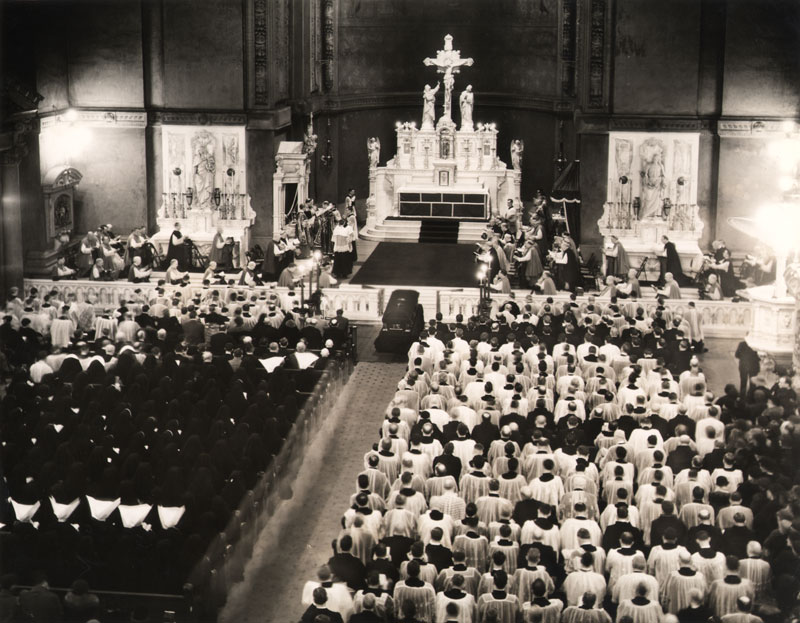There are two very controversial themes at play in today's feast; purgatory and praying for the dead. Bible-based Christian sects will revolt at the very mention of these concepts and sometimes make a Catholic feel stupid when neither term is "in the Bible". (The term "Bible" is not in the Bible either, but I digress).
 |
| Anima Sola: The Lost Soul in Purgatory |
Purgatory: This is what the Catechism of the Catholic Church tells us about Purgatory.
1030 All who die in God's grace and friendship, but still imperfectly purified, are indeed assured of their eternal salvation; but after death they undergo purification, so as to achieve the holiness necessary to enter the joy of heaven. When some people try to attack the idea of Purgatory, they usually say that a Catholic can do all sorts of nasty stuff but before they die they can make a quick confession or be assured that they can tell God "I'm sorry" in Purgatory and they are off to Heaven. Not true. That's just as silly as someone thinking that they can profess Jesus as their Lord and Savior and be Baptized, then do nasty things in life, die and go to Heaven because they were saved. But, again, I digress.
What Purgatory is for is for the "faithful" departed. Those who were "faithful" (in friendship with God by following the directions of the Church) are given the opportunity for this cleansing. Those who weren't faithful. Well, it's up to God's mercy. So what is Purgatory exactly? A place? A big waiting room in the afterlife? The Catechism again:
1031 The Church gives the name Purgatory to this final purification of the elect, which is entirely different from the punishment of the damned. The Church formulated her doctrine of faith on Purgatory especially at the Councils of Florence and Trent. The tradition of the Church, by reference to certain texts of Scripture, speaks of a cleansing fire: As for certain lesser faults, we must believe that, before the Final Judgment, there is a purifying fire. He who is truth says that whoever utters blasphemy against the Holy Spirit will be pardoned neither in this age nor in the age to come. From this sentence we understand that certain offenses can be forgiven in this age, but certain others in the age to come.
A Catholic may understand "fire" to be either metaphorical (Zech 13:9) or a physical fire. Either way, it is not a punishment nor a damnation.
 |
| Mexican Day of the Dead: All Soul's Day |
1032 This teaching is also based on the practice of prayer for the dead, already mentioned in Sacred Scripture: "Therefore Judas Maccabeus] made atonement for the dead, that they might be delivered from their sin." From the beginning the Church has honored the memory of the dead and offered prayers in suffrage for them, above all the Eucharistic sacrifice, so that, thus purified, they may attain the beatific vision of God. The Church also commends almsgiving, indulgences, and works of penance undertaken on behalf of the dead: Let us help and commemorate them. If Job's sons were purified by their father's sacrifice, why would we doubt that our offerings for the dead bring them some consolation? Let us not hesitate to help those who have died and to offer our prayers for them.
The book of Maccabees is one of the books not included in most Protestant Bibles. It is an important text to Jews, however and therefore important to us. In the above reference, you can see that prayers for the dead were being performed before Jesus was born. There is no evidence that Jesus condemned nor condoned praying for the dead. He was in favor of prayer, however.
All cultures have some device to acknowledge the dead from ancestor worship to the Mexican quasi-Catholic "Dia De Los Muertos" (Day of the Dead). Somehow, we know we just don't die and fertilize the earth. There's something more after death and something more to the dead.
 |
| Catholic Funeral Mass with clergy in black chausibles |
The church recommends black for funerals as well. Most priests wear white at funeral Masses. While this is acceptable, in my opinion it also facilitates an understanding that we have to be happy about death. We should rejoice and be glad. The Mass for Christian Burial is even called the Mass of Resurrection now. It's not that I'm against the hope of everlasting life but I am opposed to anything that robs people of knowing they can grieve and mourn. The Church intentionally allows us to embrace and acknowledge loss and suffering with respect. Sometimes the "Don't worry, be happy" theologies of people "shooting straight to heaven" can be confused with liturgies that can be construed as ignoring the fact that someone died. This is the something "more".
 |
| The Lady Gaga Vestment of Joyful Resurrection? |
 |
| In Heaven, Barbie Angels will decorate you with Moon Glitter! |
 |
| Memento Mori |
